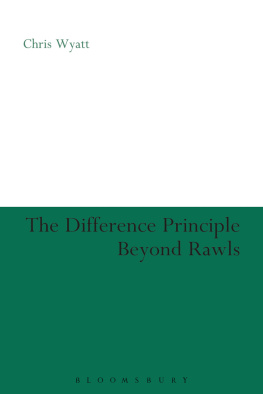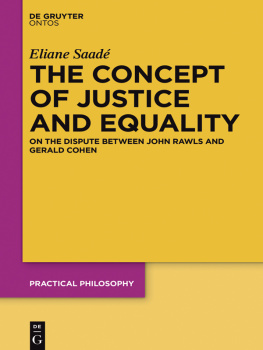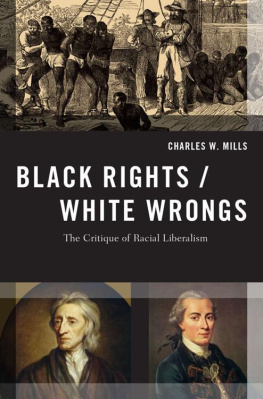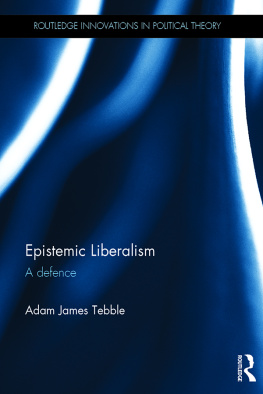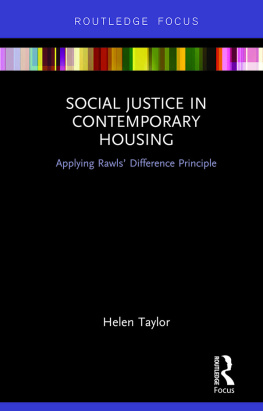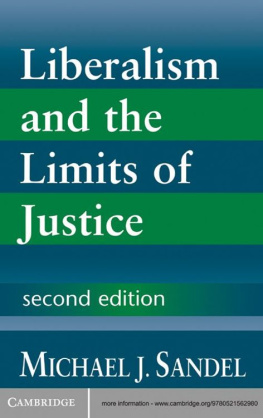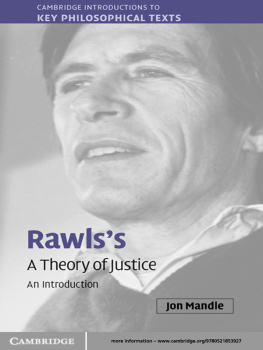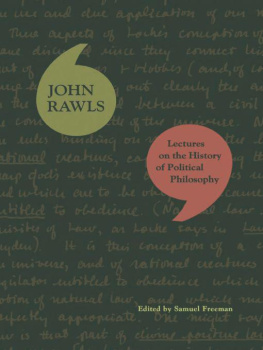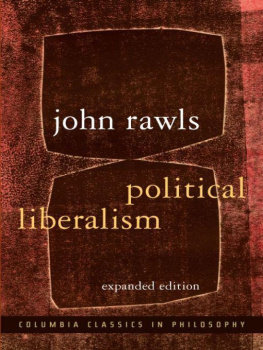INTRODUCTION
Since the publication of John Rawls A Theory of Justice (1971)followed by Political Liberalism (1993) and Justice as Fairness: A Restatement (2001)discussions on social justice and redistributive liberalism have taken centre stage in contemporary political theory. This book adds to an enormous body of literature. It does not question Rawlsian principles, but it does reject the liberal institutions he advocates. A debate is constructed in which his liberalism is contrasted with a non-statist socialism informed by the English theorist of guild socialism G.D.H. Cole. These two authors visualise alternative macro socio-economic schemes. Although they are set within modern liberal and libertarian socialist frameworks respectively, they share a commitment to reducing vast inequalities in wealth. A key component of the two principles of justice Rawls articulates is the difference principlethat inequalities are only permitted if they benefit the least well-off. Rawls proposes that citizens deliberating without awareness of subjective characteristicsa collective lack of knowledge captured by the Rawlsian term the veil of ignorancewill be compelled to prioritise a society structured to accommodate this principle to other systems in which inequalities are allowed to concentrate with lesser degrees of regulation. This assertion will not be challenged. However, it is shown how the difference principle will be more easily realised in the left-libertarian scheme I shall be defending. The argument is that Rawlsian premises point to a more radical conclusion than Rawls acknowledges. As we shall see, Coles libertarian socialist economy aims to allocate goods and resources through democratic means. Although this scheme has much to offer contemporary socialist discourseand, of equal significance, political praxisit must be recognised at the outset that certain revisions are required. Throughout this book these qualifications are introduced and analysed in detail. The resulting modernised, rejuvenated and revitalised version of Coles scheme is referred to hereafter as New Economic Democracy (NED), the rationale of which will become clear as this introductory chapter unfolds.
1. Social Justice
It will be instructive to establish what I take to be the contentious issues in Rawls theory. He is keen to promote liberal justice, what fairness means to individuals in liberal societies. The justice is distributive: it is concerned with the
For Rawls, a just constitution embodies a just procedure, within a contractarian setting, in which to procure a just outcome. The procedure is the political process of the constitution, and the outcome is just legislation; hence, if there are just circumstances and a just procedure, then the resulting distributions must also be just A word of clarity though, as the emphasis is on processes, rather than outcomes: the aim of determining which particular basic structure is the most just is not Rawls prime objective. Indeed, provided the guidelines to his procedural justice are strictly adhered to, any given outcome can be just:
... it is not always clear which of several constitutions, or economic and social arrangements, would be chosen.... Institutions within the permitted range are equally just, meaning that they could be chosen; they are compatible with all the constraints of the theory. Thus on many questions of social and economic policy we must fall back upon a notion of quasi-pure procedural justice (1971: 201).
This, however, begs the question from the array of politico-economic arrangements that fall within the range of the just outcome family: which one can reasonably be considered more just? Rawls does not get drawn in to answering this question; he leaves it open, content to conclude that both his model of property owning democracy (POD) and liberal socialism can secure the two principles and therefore be regarded as just societies. Nevertheless, he does stress that justice as fairness tries to set out guidelines for how the decision can reasonably be approached (2001: 139). He adds that in deciding between the two, information from history and political thought can be referred to; this is to supplement procedural justice (2001: 1369). I will accordingly take up the issue directly and, using the sources Rawls allows, draw a more definitive conclusion. So whilst he does not directly address the issue of democratic institutional design, a tighter application of the Rawlsian method will reveal that the realisation of the two principles of justice require reforms in property rights more extensive than POD permits. POD is articulated through general principles, it is loosely defined; by way of contrast, the institutional arrangements in NED are specified with greater precision, they are more rigorously defined. My argument has both a negative and a positive dimension: it is negative in the sense that when the two principles of justice are applied to the basic structure of POD, they cannot fulfil their purpose; it is positive in the sense that when they are applied to the basic structure of NED, they can. Following the schema of quasi-pure procedural justice, it will be shown that between NED and POD, the former constitutes the just society. This is the only logical conclusion that can be drawn when the Rawlsian method is adopted and applied more closely.
2. Rawlsian Liberalism, Coles libertarian Socialism and New Economic Democracy
As we have just seen, Rawls acknowledges that in principle the difference maxim is compatible with both capitalism and socialism (1971: 271, 546). He is critical of statist approaches to democracy. Mass democracy, I feel sure, is bound to be unsound unless it can be broken up into units of normally manageable size and complexity. We made, no doubt, many errors; but in that respect we were right and our critics wrong (1958: viii). This statement, written shortly before his death and some forty odd years after he sketched his libertarian scheme, shows that throughout his life he retained his faith that socialism, so long as it is decentralised and functional, can be soundly built. It was between 1914 and 1920 that Cole developed his theory of how to break up democracy into units of normally manageable size and complexity. His analysis led him to the advocacy of a libertarian socialism which incorporates a model of pluralist democracy. He remained adamant that this radical alternative can sustain its democratic attributes.
One of Coles most important innovations consists in moving debates in political economy beyond the (socialist) plan versus (liberal) market straitjacket by showing how consumer interests can be aggregated in consumer councils at the individual, household, municipal and regional levels. He demonstrates that the liberal emphasis on political equalities needs to be institutionalised in the relations between producers and consumers, so that supply and demand can be co-ordinated without relying on supposedly invisible hands or the concentrated power of state planners. This is an ingenious argument. He takes the ideology of consumer power and choice that is normally used by apologists of capitalism and puts it to work for very different ends. Coles model undermines capitalist social relations by de-coupling consumer choice from individual income, and by making consumer representation a right of citizenship rather than a prerogative of private wealth. Articulating consumer interests in a formally inclusive setting such as this establishes structural mechanisms in which political action can be channelled. This represents a vast improvement upon anything that is available at present Consumers do have room to manoeuvre in market economies, but, one might be tempted to ask, what is more unwieldy than trying to organise and enforce a boycott of products that have already been produced and thrown out onto the market?

